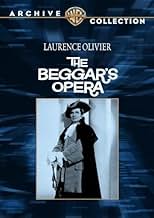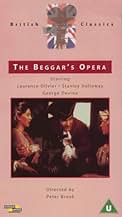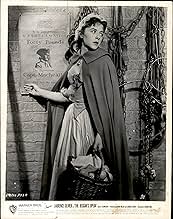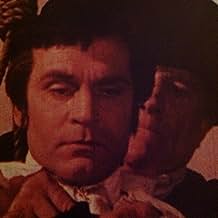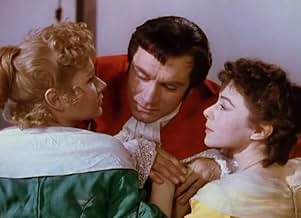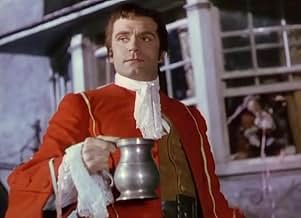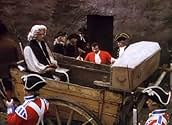अपनी भाषा में प्लॉट जोड़ेंWhen the composer of an opera about a swashbuckling, wenching highwayman meets his hero's real-life counterpart, he's disappointed with his lack of dash.When the composer of an opera about a swashbuckling, wenching highwayman meets his hero's real-life counterpart, he's disappointed with his lack of dash.When the composer of an opera about a swashbuckling, wenching highwayman meets his hero's real-life counterpart, he's disappointed with his lack of dash.
- निर्देशक
- लेखक
- स्टार
फ़ीचर्ड समीक्षाएं
As was said in my review for the 1963 production of the Britten version, John Gay's ballad/satirical opera 'The Beggar's Opera' is a lot of fun and it is no wonder it's popular with most, the dialogue, music and characters are all great. Benjamin Britten's radically different but enormously enjoyable and melodious, an ingenious and often brilliant modern re-imagining that shows the composer's individual treatment of folk-songs, version is also well worth it as well.
This 1953 film may not be completely ideal, but it is still intriguing and entertaining with a good deal to like. Occasionally, some of the dialogue loses impact when director Peter Brook tries to open up the action. While there are wonderful, imaginative visuals, Brook's directorial inexperience shows with some of the drama a bit undistinguished and stagy.
However, 'The Beggar's Opera' (1953) is a very handsome-looking film, with stylish production and costume design and some imaginative photography that succeeds in opening up the action. The music is a superb mix of rousing fun and heartfelt nuance. Most of the dialogue crackles with sharp wit and avoids being too wordy.
Most of the story absorbs and is lively in pacing, with the action being just about easy to follow and the twist is well executed.
Laurence Olivier may not have the best singing voice there is, but has charismatic swagger and energy aplenty. Hugh Griffith, Dorothy Tutin, George Devine and Stanley Holloway give him strong support.
All in all, intriguing and entertaining if not the most ideal version. 7/10 Bethany Cox
This 1953 film may not be completely ideal, but it is still intriguing and entertaining with a good deal to like. Occasionally, some of the dialogue loses impact when director Peter Brook tries to open up the action. While there are wonderful, imaginative visuals, Brook's directorial inexperience shows with some of the drama a bit undistinguished and stagy.
However, 'The Beggar's Opera' (1953) is a very handsome-looking film, with stylish production and costume design and some imaginative photography that succeeds in opening up the action. The music is a superb mix of rousing fun and heartfelt nuance. Most of the dialogue crackles with sharp wit and avoids being too wordy.
Most of the story absorbs and is lively in pacing, with the action being just about easy to follow and the twist is well executed.
Laurence Olivier may not have the best singing voice there is, but has charismatic swagger and energy aplenty. Hugh Griffith, Dorothy Tutin, George Devine and Stanley Holloway give him strong support.
All in all, intriguing and entertaining if not the most ideal version. 7/10 Bethany Cox
Multi-nominated Laurence Olivier is the rogue Captain MacHeath. Hugh Griffith is the beggar. and they are both in the the royal prison. Griffith is writing an opera about the wild adventures of such a wild man as MacHeath. and now we're in the flashback, showing what led them to their current predicament. i'm not surprised that this was a flop; it's played so straight.. it needed a hook, or bigger humor. or less singing! i know, it's an opera. still, they break into song even before the drop of a hat, and then sing about the drop and the hat. it's a lot. This was actually produced by Olivier... (my favorite Olivier film is Rebecca; its awesome. and my favorite Hugh Griffith film is Start the Revolution without Me. but he won the oscar for Ben Hur.) Directed by Peter Brook. Original opera by John Gay... lived 1685 to 1732. died young at 47 . and this story has been remade numerous times. it's a bit purient, if you read up on it, and clearly was toned down in some versions, "for decency". shows on Turner Classics now and then. not for me, but some will enjoy the music combined with story.
When this movie opened it scarcely caused a ripple in Britain and even less so in the U.S. I don't know why. It's a telling of John Gay's great work written in 1728, and the play was a blockbuster 280 years ago. It's supposed to be the first English "opera" that told a story through song and which was aimed to entertain the people. Gay took melodies wherever he found them, wrote lyrics to them to advance the storyline, and had a hit. And in another version, it still is. The Threepenny Opera by Kurt Weill and Bertolt Brecht (with Blitzstein's redone lyrics) is a fixture in theaters, and Mack the Knife is still a popular song.
Lawrence Olivier plays Macheath, a rollicking highwayman with "wives" all over London. He has two in particular, Polly Peachum, the daughter of his fence, and Lucy Lockit, the daughter of his jailer. The story of Macheath's adventures, captures and escapes are all told in song. There are horse riding songs, love songs, gambling songs, longing songs, lustful songs. The story starts in a London prison where Macheath awaits hanging. A beggar just tossed into the prison has written an opera about Macheath. He starts to tell it to the inmates and the movie takes off.
The songs are great fun and the style of the movie is very much the look of 18th century London. You can feel the fleas in the wigs, the lice in the clothes, the sheen of greasy lips, the stink of unwashed bodies.
And there are some sharp lines. "A miser might as well be satisfied with one guinea as I with one wife." "Love is a misfortune that can happen even to an indiscreet girl." "I can tell by your kiss that your gin is excellent." And when pointing out that consummation needn't wait for marriage, "Friends should not insist on ceremony."
Olivier does a masterful job, handling his own stunts, horse work and, most bravely, his own singing. He's good. On the day of Macheath's hanging, he's carted out to the gallows, sitting jauntily on his casket. While a grim-faced preacher is screaming at him to repent, he's sweeping up wenches to kiss, downing tankards of ale held up to him, and making a little girl laugh while bouncing her on his knee. Olivier plays it with great verve.
And while there's not exactly a reprieve, there is a joyous escape.
If you like Olivier, if you like things British, if you like quirky films that will probably be forgotten, this is worth seeing.
Lawrence Olivier plays Macheath, a rollicking highwayman with "wives" all over London. He has two in particular, Polly Peachum, the daughter of his fence, and Lucy Lockit, the daughter of his jailer. The story of Macheath's adventures, captures and escapes are all told in song. There are horse riding songs, love songs, gambling songs, longing songs, lustful songs. The story starts in a London prison where Macheath awaits hanging. A beggar just tossed into the prison has written an opera about Macheath. He starts to tell it to the inmates and the movie takes off.
The songs are great fun and the style of the movie is very much the look of 18th century London. You can feel the fleas in the wigs, the lice in the clothes, the sheen of greasy lips, the stink of unwashed bodies.
And there are some sharp lines. "A miser might as well be satisfied with one guinea as I with one wife." "Love is a misfortune that can happen even to an indiscreet girl." "I can tell by your kiss that your gin is excellent." And when pointing out that consummation needn't wait for marriage, "Friends should not insist on ceremony."
Olivier does a masterful job, handling his own stunts, horse work and, most bravely, his own singing. He's good. On the day of Macheath's hanging, he's carted out to the gallows, sitting jauntily on his casket. While a grim-faced preacher is screaming at him to repent, he's sweeping up wenches to kiss, downing tankards of ale held up to him, and making a little girl laugh while bouncing her on his knee. Olivier plays it with great verve.
And while there's not exactly a reprieve, there is a joyous escape.
If you like Olivier, if you like things British, if you like quirky films that will probably be forgotten, this is worth seeing.
Sir Laurence Olivier expressed a great deal of disappointment with the way The Beggar's Opera finally turned out. On reflection he probably would have done it as a straight dramatic play. Certainly the role of the swaggering outlaw Captain Macheath would seem to be a choice part.
Olivier had sung before on screen, in Fire Over England he warbled an old English ditty There Was a Spanish Lady Who Wooed an English Man and did very well by it in his portrayal of Michael Ingolby in that film. But the problem is that in Fire Over England he was the only one singing. Later on he did very well in The Entertainer as song and dance man Archie Rice. But in The Beggar's Opera his voice suffers by comparison to the trained voices that were dubbed for all the other players except Olivier and Stanley Holloway.
I guess producer Herbert Wilcox felt he couldn't dub voices as known as Olivier and Holloway. But Holloway was a musical performer so he didn't suffer by comparison.
The Beggar's Opera has been argued to be the first musical play done in the English language. John Gay wrote the book and lyrics and the music is taken from old English tunes and arranged by Johann Christoph Pepusch. It's a satire of the corrupt and bawdy age of Robert Walpole, King George I's Prime Minister and the first person to be actually called by that title.
The Age of Walpole began with the end of War of Spanish Succession and the death of Queen Anne and the Hanover succession secured. Robert Walpole had some very simple ideas on what was best for the United Kingdom. Everybody make money, eat, drink and be merry, secure good trade deals and keep out of war at all costs. You could buy anything during his time, including honor and justice. Merchant Peachum played by George Devine is a caricature of Walpole. A most greedy man who'll do anything for a pound.
Macheath knows the people he's dealing and he does it on their own terms. He gets arrested for rewards, he buys a reprieve. It really did work that way back in Walpole's time.
And he's romancing two women, Polly Peachum and Lucy Lockit although the women use him as much as he uses them. Lucy's dad is Stanley Holloway the jailkeeper who's not above a bribe or two from prisoners able to pay.
The Beggar's Opera got a Teutonic remake when Kurt Weill and Berthold Brecht did The Threepenny Opera in the last century and the immortal Mack the Knife comes from it.
Still if The Beggar's Opera was to be done in its original form, wouldn't it have been far better to have a group like the D'Oyly Carte Light Opera Company who do so well with Gilbert and Sullivan do this instead of straight players who have to be dubbed?
Olivier had sung before on screen, in Fire Over England he warbled an old English ditty There Was a Spanish Lady Who Wooed an English Man and did very well by it in his portrayal of Michael Ingolby in that film. But the problem is that in Fire Over England he was the only one singing. Later on he did very well in The Entertainer as song and dance man Archie Rice. But in The Beggar's Opera his voice suffers by comparison to the trained voices that were dubbed for all the other players except Olivier and Stanley Holloway.
I guess producer Herbert Wilcox felt he couldn't dub voices as known as Olivier and Holloway. But Holloway was a musical performer so he didn't suffer by comparison.
The Beggar's Opera has been argued to be the first musical play done in the English language. John Gay wrote the book and lyrics and the music is taken from old English tunes and arranged by Johann Christoph Pepusch. It's a satire of the corrupt and bawdy age of Robert Walpole, King George I's Prime Minister and the first person to be actually called by that title.
The Age of Walpole began with the end of War of Spanish Succession and the death of Queen Anne and the Hanover succession secured. Robert Walpole had some very simple ideas on what was best for the United Kingdom. Everybody make money, eat, drink and be merry, secure good trade deals and keep out of war at all costs. You could buy anything during his time, including honor and justice. Merchant Peachum played by George Devine is a caricature of Walpole. A most greedy man who'll do anything for a pound.
Macheath knows the people he's dealing and he does it on their own terms. He gets arrested for rewards, he buys a reprieve. It really did work that way back in Walpole's time.
And he's romancing two women, Polly Peachum and Lucy Lockit although the women use him as much as he uses them. Lucy's dad is Stanley Holloway the jailkeeper who's not above a bribe or two from prisoners able to pay.
The Beggar's Opera got a Teutonic remake when Kurt Weill and Berthold Brecht did The Threepenny Opera in the last century and the immortal Mack the Knife comes from it.
Still if The Beggar's Opera was to be done in its original form, wouldn't it have been far better to have a group like the D'Oyly Carte Light Opera Company who do so well with Gilbert and Sullivan do this instead of straight players who have to be dubbed?
This was a very enjoyable movie especially if you like period pieces and/or musicals. Hearing Laurence Olivier sing is reason enough to watch this. The cinematography is outstanding and the movie as a whole is very colorful.
Obviously, the song "Mack the Knife" made famous by Bobby Darin, Louis Armstrong and Frank Sinatra is based on this opera/movie. MacHeath is in the opera/movie as is Jenny Diver and Sukey Tawdrey. Louie Miller, Lotte Lenya and Lucy Brown are mentioned in the song (and not in the opera/movie) but, after all, MacHeath was a notorious highwayman and ladies' man.
Obviously, the song "Mack the Knife" made famous by Bobby Darin, Louis Armstrong and Frank Sinatra is based on this opera/movie. MacHeath is in the opera/movie as is Jenny Diver and Sukey Tawdrey. Louie Miller, Lotte Lenya and Lucy Brown are mentioned in the song (and not in the opera/movie) but, after all, MacHeath was a notorious highwayman and ladies' man.
क्या आपको पता है
- ट्रिविया"The Beggar's Opera" is a ballad opera popular during the early eighteenth century, which used the music of popular folk songs, ballads and church hymns set to new lyrics to satirize social customs, mores, and especially Italian opera. It copied the three act Italian operatic format, rather than the then-custom of five acts.
- भाव
Captain MacHeath: [Hearing a woman singing] Women!... I love the sex!... and a man who loves money might as well be contented with one guinea... as I with one woman.
- क्रेज़ी क्रेडिटUnusually, the ghost vocalists for the non-singing actors were given billing in the end credits.
- कनेक्शनFeatured in Carry on Forever: एपिसोड #1.1 (2015)
टॉप पसंद
रेटिंग देने के लिए साइन-इन करें और वैयक्तिकृत सुझावों के लिए वॉचलिस्ट करें
विवरण
बॉक्स ऑफ़िस
- बजट
- £5,00,000(अनुमानित)
- चलने की अवधि
- 1 घं 34 मि(94 min)
- पक्ष अनुपात
- 1.37 : 1
इस पेज में योगदान दें
किसी बदलाव का सुझाव दें या अनुपलब्ध कॉन्टेंट जोड़ें

